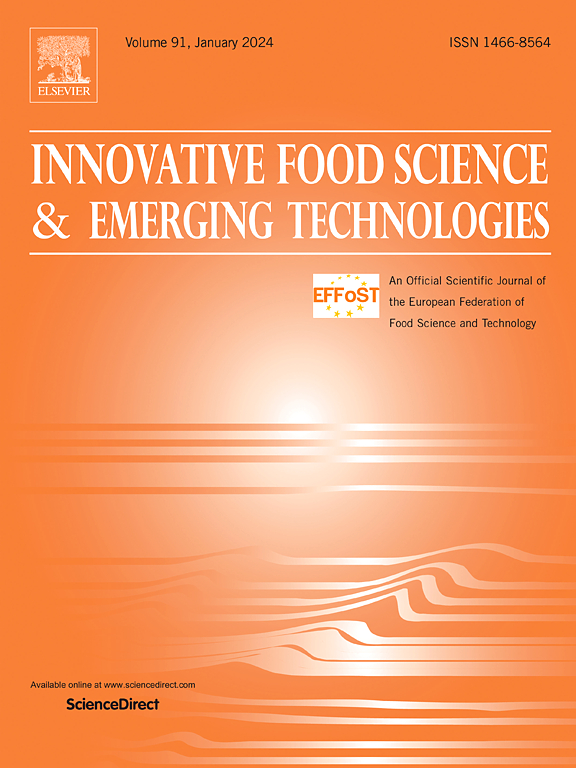不同时间和强度磁场作用下蛋白功能特性的改善
IF 6.3
1区 农林科学
Q1 FOOD SCIENCE & TECHNOLOGY
Innovative Food Science & Emerging Technologies
Pub Date : 2025-03-21
DOI:10.1016/j.ifset.2025.104006
引用次数: 0
摘要
本研究旨在评估磁场应用技术在确保鸡蛋蛋白微生物安全性方面的有效性,该技术具有最小的负生物学效应和无毒性效应。此外,它还要求评估施加磁场对蛋白的物理化学影响,并将这些影响与目前的工业标准巴氏杀菌的影响进行比较。将240 mT的磁场作用于蛋白两种不同的时间(在25°C下30-60分钟)。在4°C的21天储存期内,将经磁场处理的样品的物理化学和微生物特性与未经加工和工业巴氏消毒的样品进行比较。磁场的应用增强了泡沫的容量和稳定性。在储存的第7天,泡沫容量达到了1245%,而在储存的第一天,泡沫稳定性的最高水平是83%,样品经受了30分钟的磁场作用。观察到磁场的应用对样品的微生物学结果是有效的。在21天的储存期结束时,与原始样品相比,磁场作用60分钟导致大肠菌群总数减少0.52 log cfu/g。磁场处理表明样品的微生物负荷显著减少,同时增强了蛋白的功能特性。研究结果表明,磁场可用于液态鸡蛋的商业巴氏杀菌;然而,该系统需要作为一个连续的过程进一步发展,必须对产品产量和工业适用性进行调查。本文章由计算机程序翻译,如有差异,请以英文原文为准。
Improvement of the functional properties of albumen exposed to different durations and intensities of magnetic field application
This study aimed to assess the efficacy of magnetic field application, a sustainable technology with minimal negative biological and no toxic effects, in ensuring the microbiological safety of chicken egg albumen. Additionally, it contested to evaluate the physicochemical effects of the applied magnetic field on albumen and to compare these effects with those of pasteurization, the current industry standard. A magnetic field of 240 mT was applied to the albumen for two different durations (30–60 min at 25 °C). The physicochemical and microbiological characteristics of the samples treated with the magnetic field were compared to those of raw and industrially pasteurized samples throughout a 21-day storage period at 4 °C. The application of the magnetic field enhanced foam capacity and stability. The highest foam capacity reached 1245 % on the seventh day of storage, whereas the highest level of foam stability was 83 % on the initial day of storage in samples subjected to a 30-min magnetic field application. The application of the magnetic field was observed to be effective on the microbiological results of the samples. At the end of the 21-day storage period, 60-min magnetic field application resulted in a decrease of 0.52 log cfu/g in total coliform bacteria count compared to raw samples. The treatment with magnetic fields demonstrated a significant reduction in the microbial load of the samples, alongside an enhancement in the functional properties of albumen. The study's results indicate that magnetic fields can be utilised in the commercial pasteurization of liquid eggs; nevertheless, the system requires further development as a continuous process, and investigations into product yield and industrial applicability must be undertaken.
求助全文
通过发布文献求助,成功后即可免费获取论文全文。
去求助
来源期刊
CiteScore
12.00
自引率
6.10%
发文量
259
审稿时长
25 days
期刊介绍:
Innovative Food Science and Emerging Technologies (IFSET) aims to provide the highest quality original contributions and few, mainly upon invitation, reviews on and highly innovative developments in food science and emerging food process technologies. The significance of the results either for the science community or for industrial R&D groups must be specified. Papers submitted must be of highest scientific quality and only those advancing current scientific knowledge and understanding or with technical relevance will be considered.

 求助内容:
求助内容: 应助结果提醒方式:
应助结果提醒方式:


